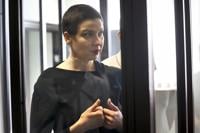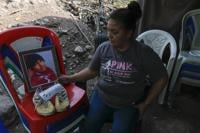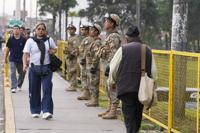TALLINN, Estonia (AP) — A prominent member of the Belarusian opposition serving an 11-year prison sentence for helping organize anti-government protests was taken to a hospital emergency department and underwent surgery, her father said Tuesday.
Alexander Kolesnikov said his daughter, Maria Kolesnikova, was in grave but stable condition. The doctors didn’t share her diagnosis or any other details with him about the surgery, Kolesnikov said.
He noted that his daughter looked energetic and cheerful when he last visited her in prison in the southern city of Homiel about a month ago.
Kolesnikova has been in custody since her arrest in September 2020, when she tore up her passport at the border to prevent her forced expulsion from amid massive protests challenging the reelection of the country's authoritarian president, Alexander Lukashenko.
She was convicted in September 2021 on charges of conspiring to seize power, creating an extremist organization and calling for action that threatened the security of the state.
Her lawyer, Vladimir Pylchenko, said Kolesnikova had been placed in a penitentiary cell before she was taken to the hospital. He didn't elaborate on her condition.
Pylchenko said that authorities had repeatedly rejected his requests to see Kolesnikova at the prison in Homiel.
Sviatlana Tsikhanouskaya, in the August 2020 election that resulted in Lukashenko being awarded a sixth term, demanded that the authorities release information about Kolesnikova's condition.
“Don't let the regime maintain the lid of silence over Maria Kolesnikova's health,” Tsikhanouskaya wrote on her messaging app channel.
Belarus was shaken by months of protests after the disputed election, which the opposition and the West denounced as a rigged sham. Lukashenko responded to the demonstrations with that saw more than 35,000 people arrested and thousands beaten by police. Tsikhanouskaya was forced to leave the country.
Kolesnikova helped coordinate opposition protests and resisted authorities’ attempts to force her to leave the country. When officers of the Belarusian security agency drove her to the border with Ukraine in September 2020 to forcibly expel her, she ripped up her passport and walked back into Belarus to face arrest.
Just before the start of her trial, Kolesnikova said in a note from prison that authorities offered to release her from custody if she asked for a pardon and gave a repentant interview to state media. She insisted that she was innocent and rejected the offer.
“Freedom is worth fighting for. Do not be afraid to be free,” she wrote from prison. “I do not regret anything and would do the same again.”
___
Follow AP's coverage of Belarus at








































